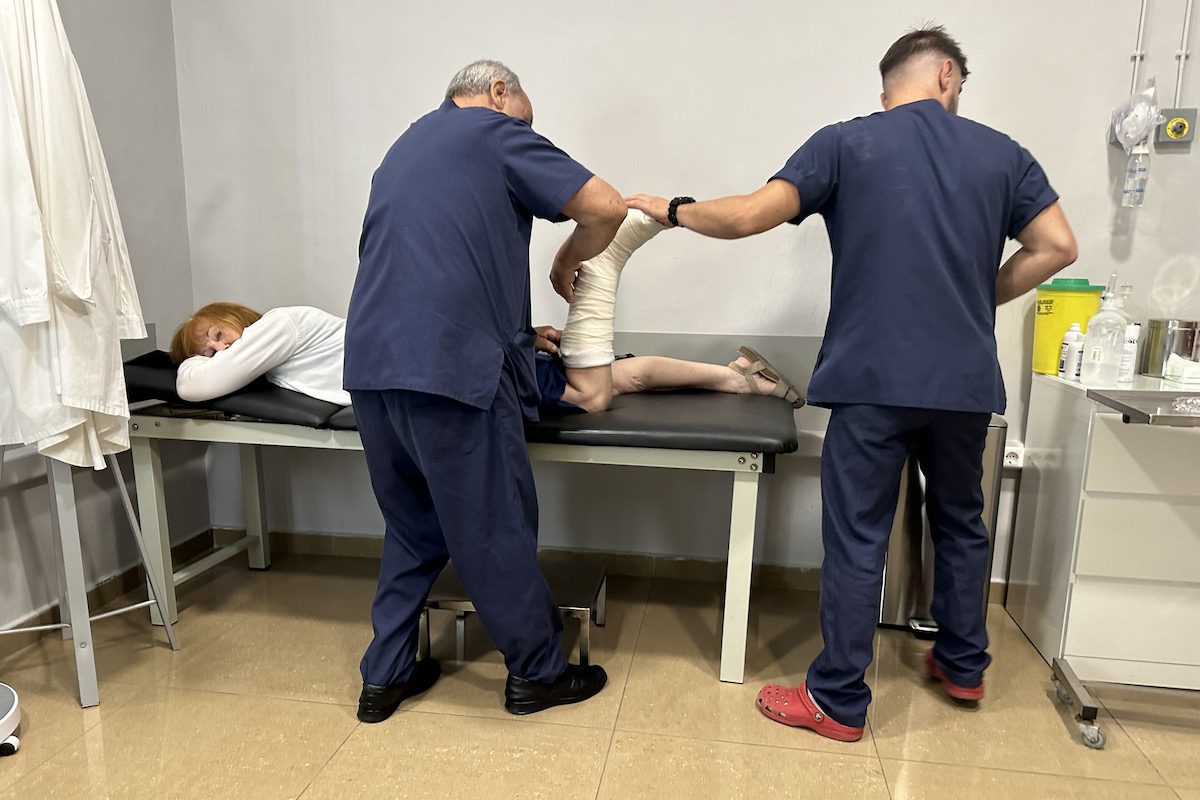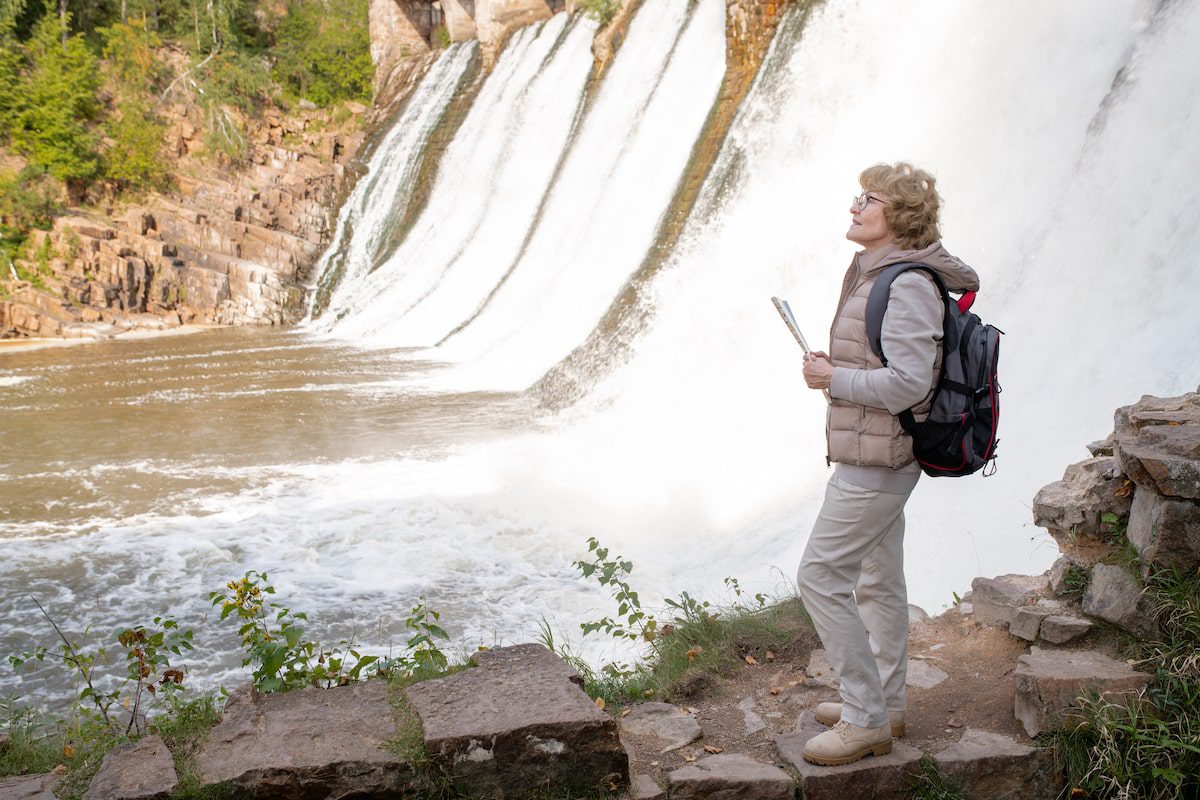Featured image: Anyhing can happen on a vacaation. Here are some tips to be prepared | Photo by Pressmaster on Envato
How to be ready for the unexpected
by Diana Eden
As your over-80 Contributing Writer for JourneyWoman, I feel obliged to tell you that on my trip to Greece in October, I had an injury while travelling. It is important to note that I believe this had nothing to do with my age and could have happened to a 20- or 50-year-old.
Here’s what happened: I exited our little villa in Santorini, not knowing that low clouds had deposited a layer of wetness on the pavement outside our door and slipped. I fell hard and lost consciousness, breaking my ankle bone. Now that I am safely home and mending well, I want to share what this experience taught me.
Get important stories like this one directly to your inbox. Join our mailing list here!

Diana after her injury in Greece / Photo by Carol Moore-Ede
How to deal with an injury while travelling
1. Buy travel insurance before you leave
This goes without saying, especially for us older travellers. But also know where the policy is and what the number is. Don’t have it buried in some printout at the bottom of your suitcase or buried in your files in your email. Have the contact number already listed in your phone directory. You have no idea how much brain fog you may have after a traumatic event and how overwhelming digging out these phone numbers and policy numbers can be.
Also, keep your flight confirmation numbers handy. Rearranging your return flight plans can be complicated and require patience as you wait in the endless phone queue.
Basic travel insurance covers various areas, including trip cancellation, interruption, delays, and medical expenses. On your return, you will have endless forms to fill out with proof of original payment, evidence of the various vendors’ non-cancellation policies, and proof of payment for the new travel plans needed. Mine will not let me file a claim until my primary health insurance here at home has processed my claim and paid it (or denied it), so the process for reimbursement may take months.
It is essential that you get copies of all the expenses at the time they occur—doctors’ reports, diagnoses, treatment summaries, and fully itemized bills. You will also need documents for any expenses along the way. I had to take a taxi to the airport that cost me 100 euros (cash) but forgot to get a receipt, so this particular 100 euros will not be reimbursed by insurance, even though my accident made it necessary.
Did you know that certain credit cards (I use Chase Sapphire Preferred, but two of the Amex premium cards do the same thing) include complimentary coverage if you purchase your flights and bookings with them? Medical coverage is limited to $2500 if you are more than 100 miles from home, but significant insurance is offered for flight delays, cancellations, interruptions, lost baggage, and more.
2. Always have a way to reach help
Always, always have your cell phone at arm’s length (or an Apple Watch that can make calls) and always have it charged. Falling in the shower and having your phone in the bedroom doesn’t help, or having it in your pocket but about to lose power is also a losing plan. Before I travel, I always ensure I have the correct plug adapter for the country I am visiting, and I also take a backup charger such as this one from IWalk.
3. Have a lifeline to a knowledgeable local
In my case, our villa had a manager/concierge/driver who was always available by phone or WhatsApp and usually within 20 minutes in person. I would hate to think what my sister and I would have done if we were in an Airbnb with an off-site owner (sometimes the owner is not even in the same country and only employs a cleaning crew between guests). You need access to a person who knows the local medical centers and where to take you if you are ill or have an accident. In my case, we were blessed with the most caring man who knew what to do and was kind and encouraging throughout.
As a backup, your travel insurance 24-hour hotline number is supposed to be able to locate the nearest doctor or hospital, no matter where you are.
However, you should know that in the event of a serious condition like a heart attack or car accident, the number to call for an ambulance in the EU is 112. Most countries also have a 911 equivalent that works; for instance, in the United Kingdom, you’d dial 999 (source: Rick Steves). It might be worth it to learn these numbers ahead of time.
If you are travelling solo but joining a group tour, your well-being is your tour leader’s job from sun up to sun down, whether you are driving around visiting the sights or having an emergency. I have witnessed tour leaders performing this function with expertise in Africa and Morocco, where I was on small group tours.
4. Make sure you have access to plenty of money
In my case, I got excellent care from a well-known and experienced orthopedic surgeon, but being in a private clinic, it was a “pay on check-out” arrangement. I would settle up with insurance later.
The bill was in the $20,000 range, and it cleaned out my credit on my cards. I had maintained a high credit limit on American Express in case of emergencies, but many places in Europe do not take that card. Nothing makes you feel more vulnerable than being far from home and wondering if you can access the money you need. I had never thought I would need access to more than a few hundred dollars for dinners, excursions, and souvenirs! This was eye-opening.
5. Wheelchair assistance
At least in Europe, where my accident took place, there is excellent wheelchair assistance, and though I was in pain and with a boot and crutches, I relied on the wheelchair agents to get me from gate to gate for three separate flights. They also helped me down the aisle of the plane with a narrow chair designed just for that purpose. Even the inter-island ferry that got us from Santorini to Crete had wheelchair assistance, though they nearly made me miss the ferry, and there was no elevator to get me up to my first-class seat, which I had paid for!
6. There are good people everywhere ready to help
Generally, I found that there are good people in most places that are willing to help. Still, for the more specific needs, such as re-booking airfare or dealing with bureaucratic red tape, you need an experienced local with an investment in your well-being and fluent in the language, such as the local host of our villa in Crete. Aegean Airlines would not issue me a boarding pass unless I had a form filled out by my surgeon (and ONLY him!) It took some extensive and complicated sleuth work to find the doctor back in Athens by then and get the form handled. I don’t know what I would have done without our host.
7. When you are feeling your worst, try a bit of meditation
It may sound silly, but during my very worst moments of anxiety, I was able to use some techniques of breathing and yoga to keep me calm and focused on the here and now. During the last two hours of my flight home (#3 of 3, and at the end of 19 hours of travelling), when I thought I might “lose it,” I sat in my seat and took deep, slow breaths. I rotated my shoulders and wrists, my neck and head, and the few parts of my body I could move without hurting my leg or invading the space of my seat neighbour. It calmed me enough to get me into Las Vegas airport and home.
Despite the unexpected accident while travelling, I received excellent medical treatment in Greece, given with both expertise and kindness. I received the help of strangers and wheelchair pushers. I couldn’t have done it without the help of our local accommodation hosts. And I was exceedingly lucky to have the help and support of my travelling companion, my sister.
I will heal completely, and I WILL travel again. In fact, my next trip is coming up in eight weeks.
More on Staying Safe While Travelling
JourneyWoman Webinar: Women’s Safety and Cybersecurity on November 19, 2024
Join our panel of experts on November 19 to learn how to protect yourself against cybersecurity at home and while traveling.
Planning for an Emergency During Travel: Safety Tips for Earthquakes, Forest Fires and More
Unpredictable weather patterns mean that women need to be prepared for natural disasters, from forest fires to earthquakes.
Travel Technology: What is a VPN or Virtual Private Network?
Our Travel Technology series answers the question: ‘what is a VPN’, to help you protect your privacy on public networks.








0 Comments
We always strive to use real photos from our own adventures, provided by the guest writer or from our personal travels. However, in some cases, due to photo quality, we must use stock photography. If you have any questions about the photography please let us know.
Disclaimer: We are so happy that you are checking out this page right now! We only recommend things that are suggested by our community, or through our own experience, that we believe will be helpful and practical for you. Some of our pages contain links, which means we’re part of an affiliate program for the product being mentioned. Should you decide to purchase a product using a link from on our site, JourneyWoman may earn a small commission from the retailer, which helps us maintain our beautiful website. JourneyWoman is an Amazon Associate and earns from qualifying purchases. Thank you!
We want to hear what you think about this article, and we welcome any updates or changes to improve it. You can comment below, or send an email to us at [email protected].